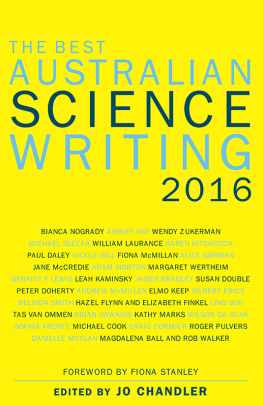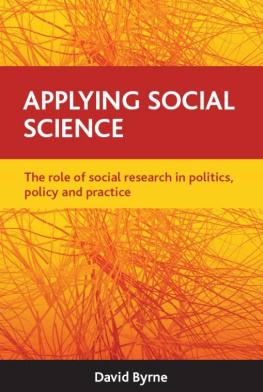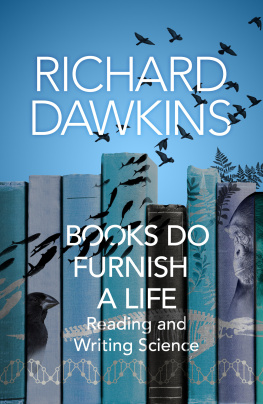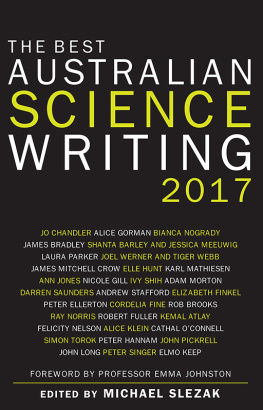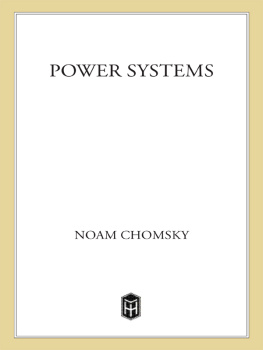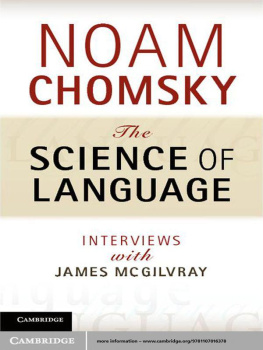Contents
19 Complex Networks, Feedback Loops, and the Cities of the Future:
Carlo Ratti and Steven Strogatz
Introduction
When I first jotted science is culture down on a mock-up of the cover of Seed, it was more of an aspiration than an observation. I started a science magazine during an American administration that not only opposed science but devalued empiricism. This emboldened activists around the world who rejected evolution and sought to reform science education with their own version of truth. But at the same time, in the vitality of this antiscientific movement, you could sense the imminent rise of a cultural shift they sought to prevent. I had the idea that science was becoming the fundamental driver of our times and held unique promise to improve the state of the world. I believed that we were on the cusp of a twenty-first-century scientific renaissance, and I wanted to create a magazine to capture this cultural shift. I called it Seed because thats how I saw science: where things start, beneath the surface of all that surrounds us.
Today our tagline seems self-evident: science is culture. In the last decade, science has transformed the social, political, economic, aesthetic, and intellectual landscape. It is reshaping our understanding of who we are and where we come from and modernizing our system of valueshow we regard our planet and one another. Other forces undeniably affect the state of the worldfaith, democracy, and free markets among them. But science is the overwhelming and universal agent of change. Today, science affects every single person on the planet.
These are times for great optimismabout what we can know and accomplish. In the last decade, we mapped the human genome and the cosmic microwave background. We confirmed the existence of dark energy and the age of the universe, and know that it is expanding. We sequenced the rice genome. We found evidence of oceans on Mars and landed for the first time on another planets (Saturn) moon. We know that we have more in common with Earths other biota than we once thought. We built a machine capable of approximating the big bang, used the Internet to study human behavior, and produced more data than in all prior human history. We awarded scientists the Nobel Peace Prize.
These are also times of great uncertainty. We now notice that the systems that support life and commerce on this planet are riddled with complexity and interdependence of an unimaginable scale. We see that we cannot solve epidemics, for example, with solving climate change; we cannot solve climate change without rethinking economic growth; we cannot reconsider growth without an understanding of population and demographics; and we cannot anticipate population shifts without considering epidemics. The toolbox that served us well in the twentieth century is inadequate to wrestle with the systemic challenges apparent at the dawn of the twenty-first.
We need a new way of looking at the world. We need to rekindle the conviction that knowledge is good, and more knowledge is better. We need to be reminded that disciplines are man-made creations, useful only to a degree. Like the Renaissance of the fifteenth and sixteenth centuries, the renaissance before us will be characterized by a revolution in how knowledge is gathered, synthesized, and applied to society. And once again, science will mean more to us than its output, than drugs and technologies; more than something to be governed, science will become a way of governing and thinking.
Today, we think scientifically about issues like health and the environment, but soon we will also think scientifically about the size of cities, the reason for poverty, the basis of morality, the resilience of markets, and much more.
Science is a methodology and philosophy rooted in evidence, kept in check by persistent inquiry, and bounded by the constraints of a self-critical and rigorous method. Science is a lens through which we can visualize and solve complex problems, establish international relations, and embolden (even reignite) democracy. More than anything, what this lens offers us is a limitless capacity to handle all that comes our way, no matter how complex or unanticipated.
We are on the cusp of this renaissance, not in the midst of it. For all that science has contributed to our lives in the past half century, it hasnt yet universally changed the way we think. And it wont unless we understand and address why.
In times of uncertainty, fear becomes the overwhelming faculty. People seek out quick and easy answers and comfort, and religion offers both. It is soothing to think that when the ground shakeskilling two hundred thousand people in an already destitute nationthere is a grander purpose to it all, an underlying beneficent plan. Much less comforting is the objective explanation: that the Earths tectonic plates constantly move and grind against one another, so there is compression and subduction, and the occasional violent rupturea terrifying, but ultimately random and meaningless event. But it is only by studying those geological forcesand today we canand embracing the findings, that we will be able to better predict earthquakes and save lives. Were not there yet
Because science and religion are at war, embroiled in a battle that has not strengthened either side; it has served only to strengthen the bases, not convert the masses. (And the base for religion is a lot bigger than the base for science!) Thats not to say the "culture war" not been an intellectually useful exercise; it has. But religion will not overturn science and science will not overturn religion; both are too fundamentally rooted in societythe global economy is built on science; more than two-thirds of the worlds population believes in a God. Pursuing each other's demise is ultimately deleterious to both and compromises the much more important goal of actually improving the state of the world. For the benefit of humanity, we need most of the seven billion people on this planet to embrace science as the way forwardwe need them to use vaccines, fund stem cell labs, and support carbon taxes, not march against them.
The trouble with (commonly practiced organized) religion is not God. It is that it offers truth without a way of questioning it. Worse, it punishes you for questioning it. We simply cannot move forward in these times with this dogma.
Every child around the world should be taught to embrace the scientific method (this is what scientific literacy must mean in this century)before they hear about God. And we should be reminded always that we have the right to question everythingthat changing our minds with new evidence is a virtue not a cause for condemnation. If one then chooses faith and subjects it to permanent scrutiny, then religion is no longer the enemy. In the interest of global stability, science must precede faith but not seek to overturn it.
I should note that one of the practical problems here is that, unlike religion, science has no ordained leaders with the pulpit to make this plea. Science does not issue talking points. Ironically, this weakness, this absence of idols and enforced consensus, confers unique strength and stability to science. So perhaps instead, the worlds priests and sheikhs and rabbis might take up the position.
Richard Feynman, the Nobel Prizewinning physicist, once told this story on television:
I have a friend whos an artist and hes sometimes taken a view which I dont agree with very well. Hell hold up a flower and say, look how beautiful it is, and Ill agree. And he says, you see, I, as an artist, can see how beautiful this is, but you as a scientist, oh, take this all apart and it becomes a dull thing. And I think hes kind of nutty. First of all, the beauty that he sees is available to other people and to me too, although I might not be quite as refined aesthetically as he is. But I can appreciate the beauty of a flower. At the same time, I see much more about the flower than he sees. I could imagine the cells in there, the complicated actions inside which also have a beauty. The fact that the colors in the flower are evolved in order to attract insects to pollinate it is interestingit means that insects can see the color. It adds a questiondoes this aesthetic sense also exist in the lower forms? Why is it aesthetic? A science knowledge only adds to the excitement and mystery and the awe of a flower. It only adds. I dont understand how it subtracts.


